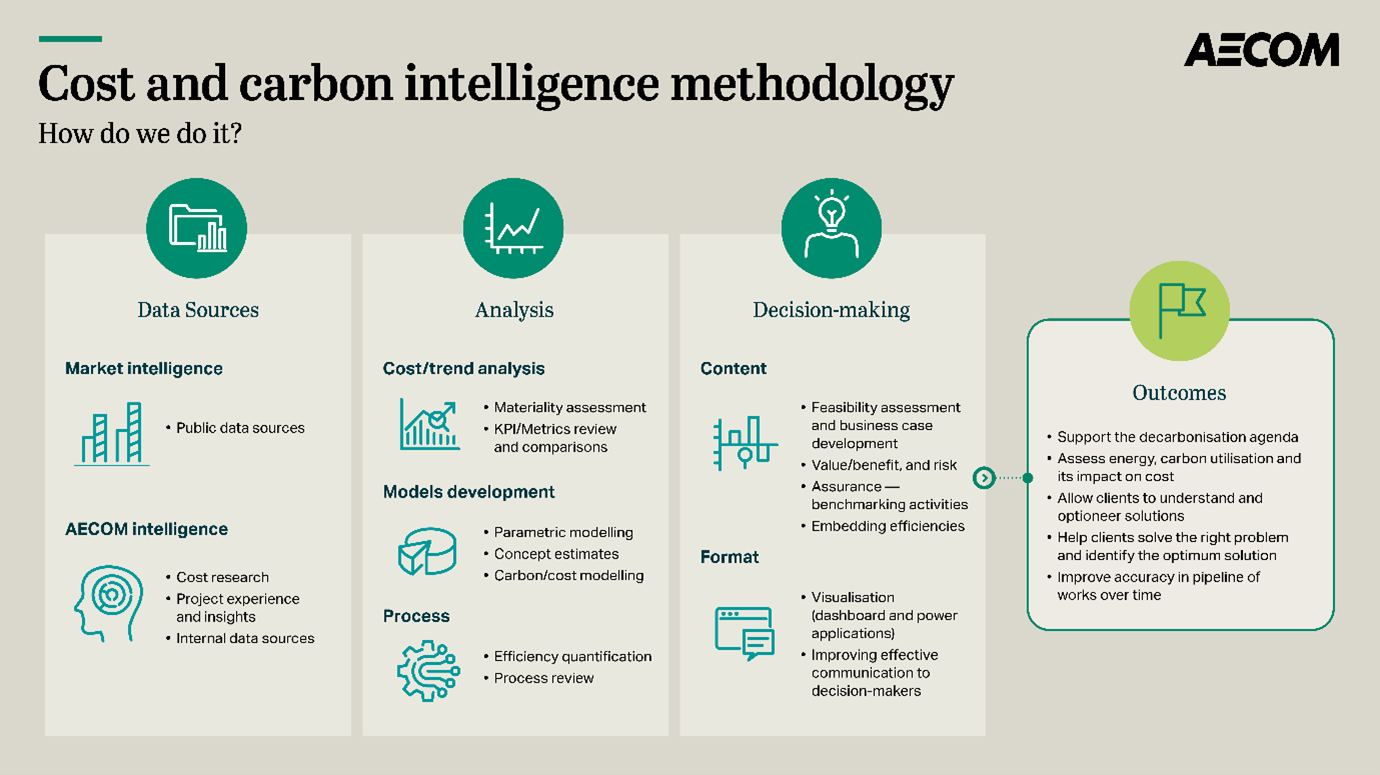The pursuit of cost and carbon intelligence
As we race to achieve a net zero society and adapt to the impacts of climate change, how we make decisions today will impact our success tomorrow.
Around 70 per cent of Australia’s greenhouse gas emissions are associated with infrastructure projects. With such an opportunity for impact, it’s essential that we continually examine our processes and actions to enable effective decision-making and continuous learning.
Cost intelligence is linking available datasets together, using the most applicable analytics techniques, and leveraging specialist knowledge to provide context to outputs. By understanding aspects like digital capability, construction processes, project delivery and data management, we improve a project’s governance, value for money and efficiency, and enable better business planning.
Over time, these inputs will change, so cost and carbon intelligence act as a learning system that will evolve and improve, helping us analyse the right information in the right format to understand the complex problems we are trying to solve.
Where does carbon fit in?
Cost has always been a driving measure behind organisational decision-making, but with pressure rising to create broad, meaningful outcomes across infrastructure projects, we need to expand our analysis. Like cost, carbon can be measured to help us make intelligent decisions around carbon.
There is a carbon ‘cost’ for every resource consumed – the exchange we pay in carbon for consuming a resource. Carbon, like cost, is a currency of resource consumption and should be measured and tracked over the lifespan of a project. After all, what gets measured, gets managed.
As we transition to this more holistic analysis approach, the integrity of our data sets will determine our success. Data granularity and transparency across organisations are key to understanding cost and carbon use, and moving toward highly collaborative delivery models will deliver more intelligent projects.
However, carbon is only one measure, and we must analyse the value of other environmental and social impacts to make an intelligent decision that serves the environment, community, and business needs. In Australia, as more states explore water solutions like recycled water and desalination plants, a cross-section of analysis will be integral to achieving a good carbon outcome as well as social and environmental benefits.
The methodology
Data analysis to inform decision-making is not a new concept, but success lies in how the data is analysed. At AECOM, Cost and Carbon Intelligence brings together over 30 specialists across multiple disciplines, including data analysts, cost managers and business analysts, alongside sector specialists.

From data to action
Consider a scenario where we film the entire construction process across all major construction sites. We use machine learning to generate scheduling, productivity, and waste data points. This creates a vast dataset for each project, which can be used in many ways, such as predicting the outcome of future projects or removing waste activities from a process. However, without understanding the project objectives and various key performance indicators, these datasets lose their meaning.
But if we integrate specialist knowledge, broader industry trends, and carbon and cost modelling with analytics techniques, we can organise our information and visualise the outputs. Organisations are then empowered to make effective decisions and achieve intelligent outcomes by creating digestible and actionable information.
Driving results for Anglian Water
Anglian Water is the largest water and water recycling company in England and Wales by geographic area, supplying water and water recycling services to almost seven million people in the East of England.
Using the Commercial Outperformance and Construction Economics (COCE) framework, an alliance between AECOM, Mott MacDonald, and Turner & Townsend, we are working alongside Anglian Water to enable cost savings and efficiencies to Anglian Water’s operating expenditure and capital expenditure programmes.
The alliance has over 70 people working with Anglian Water across the COCE framework and is responsible for providing commercial services across both capital and operational programs. These services range from contract administration, project controls and project management, procurement, efficiency reviews, risk and cost management to benchmarking, supply chain and market analysis.
Cost and carbon intelligence is a key driver within COCE’s work, supporting the investment planning cycle and providing confidence to key decision makers on what will be over £3 billion of capital spend over the next five years. By combining our integrated capability, we can provide best-in-class core services, solution development, and business reach back to help Anglian Water deliver and outperform its five-year AMP7 business plan and beyond.






